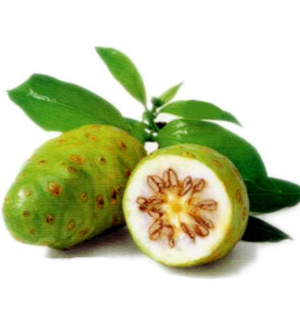Noni

Contents
Uses
- Noni is a small evergreen tree in the Pacific Islands, Southeast Asia, Australia, and India that often grows among lava flows. Historically, noni was used to make a red or yellow dye for clothing. It was also used as medicine, usually applied to the skin.
- Today, noni fruit, leaves, flowers, stems, bark, and roots are still used to make medicine for a long list of ailments. However, the effectiveness of noni for these uses has not been proven. A study of noni freeze-dried fruit extract is underway at The National Center for Complementary and Alternative Medicine, but the results are not yet in. In the meantime, the FDA has issued multiple warnings to noni manufacturers about health claims that aren’t backed up by fact.
- People take noni by mouth for colic, convulsions, cough, diabetes, painful urination, stimulating menstrual flow, fever, liver disease, constipation, vaginal discharge duringpregnancy, malarial fever, and nausea. It is also used for smallpox, enlarged spleen, swelling, asthma, arthritis and other bone and joint problems, cancer, cataracts, colds,depression, digestive problems, and gastric ulcers. Other uses include high blood pressure, infections, kidney disorders, migraine headache, premenstrual syndrome,stroke, pain, and sedation.
- The fruit juice is used for arthritis, diabetes, high blood pressure, muscle aches and pains, menstrual difficulties, headaches, heart disease, AIDS, cancers, gastric ulcers, sprains, depression, senility, poor digestion, atherosclerosis, circulation problems, and drug addiction.
- The leaves have been used in medicines for rheumatic aches and swelling of the joints, stomachache, dysentery, and swelling caused by a parasitic infection calledfilariasis. The bark has been used in a preparation to aid childbirth.
- Noni is sometimes applied to the skin. It is used as a moisturizer and to reduce signs of aging. The leaves are used for arthritis by wrapping around the affected joint; for headache by applying to the forehead; and for burns, sores, and wounds by direct application. A mixture of leaves and fruit is applied to pockets of infection (abscesses), and preparations of the root are used on stonefish and sting-ray wounds, and as a smallpox salve.
- In foods, the fruits, leaves, roots, seeds, and bark are eaten.
- The smell and taste of some Noni fruit and juice are unpleasant.
Benefits
- Noni contains many substances, including potassium. Some of these substances might help repair damaged cells in the body, activate the immune system, and have other activities.
Cautions
- Noni is POSSIBLY SAFE when the fruit is consumed as food. However, there is concern that taking noni in medicinal amounts is POSSIBLY UNSAFE. Noni tea or juice might cause liver damage in some people. There are several reports of liver damage in people who drank noni tea or juice for several weeks. However, it is not known for certain if noni was the cause.
- Pregnancy and breast-feeding: Do not take noni if you are pregnant. Historically, noni has been used to cause abortions. It is also best to avoid noni if you are breast-feeding. Not enough is known about the safety of taking noni during breast-feeding.
- Kidney problems: Noni contains large amounts of potassium. This can be a problem, especially for people with kidney disease. There is one report of a person with kidney disease developing high levels of potassium in the blood after drinking noni juice. Don’t use noni if you have kidney problems.
- High potassium levels: Drinking noni fruit juice might increase potassium levels and make them even higher in people with already too much potassium in their body.
- Liver disease: Noni has been linked to several cases of liver damage. Avoid using noni if you have liver disease.
Interactions
Moderate Interaction Be cautious with this combination
- Medications for high blood pressure (ACE inhibitors) interacts with NONI: Some medications for high blood pressure can increase potassium levels in the blood. Consuming noni juice along with these medications for high blood pressure might cause too much potassium in the blood.
- Some medications for high blood pressure include captopril (Capoten), enalapril (Vasotec), lisinopril (Prinivil, Zestril), ramipril (Altace), and others.
- Medications for high blood pressure (Angiotensin receptor blockers (ARBs)) interacts with NONI: Some medications for high blood pressure can increase potassium levels in the blood. Consuming noni juice along with these medications for high blood pressure might cause too much potassium to be in the blood.
- Some medications for high blood pressure include losartan (Cozaar), valsartan (Diovan), irbesartan (Avapro), candesartan (Atacand), telmisartan (Micardis), eprosartan (Teveten), and others.
- Medications that can harm the liver (Hepatotoxic drugs) interacts with NONI: Noni might harm the liver. Taking noni along with medication that might also harm the liver can increase the risk of liver damage. Do not take noni if you are taking a medication that can harm the liver.
- Some medications that can harm the liver include acetaminophen (Tylenol and others), amiodarone (Cordarone), carbamazepine (Tegretol), isoniazid (INH), methotrexate (Rheumatrex), methyldopa (Aldomet), fluconazole (Diflucan), itraconazole (Sporanox), erythromycin (Erythrocin, Ilosone, others), phenytoin (Dilantin), lovastatin (Mevacor), pravastatin (Pravachol), simvastatin (Zocor), and many others.
- Warfarin (Coumadin) interacts with NONI: Warfarin (Coumadin) is used to slow blood clotting. Taking noni juice might decrease how well warfarin (Coumadin) works to slow blood clotting. This could increase the chance of blood clotting.
- Water pills (Potassium-sparing diuretics) interacts with NONI: Noni contains large amounts of potassium. Some “water pills” can also increase potassium levels in the body. Taking some “water pills” along with noni might cause too much potassium to be in the body.
- Some “water pills” that increase potassium in the body include amiloride (Midamor), spironolactone (Aldactone), and triamterene (Dyrenium).
Other Names
Ba Ji Tian, Bois Douleur, Canarywood, Cheese Fruit, Hai Ba Ji, Hawaiian Noni, Hog Apple, Indian Mulberry, Jus de Noni, Luoling, Mengkudu, Menkoedoe, Mora de la India, Morinda, Morinda citrifolia, Mulberry, Mûre Indienne, Nhau, Noni Juice, Nono, Nonu, Pau-Azeitona, Rotten Cheese Fruit, Ruibarbo Caribe, Tahitian Noni Juice, Ura, Wild Pine, Wu Ning, Yor.
References
Source: WebMD, “Noni”, http://www.webmd.com/vitamins-supplements/
